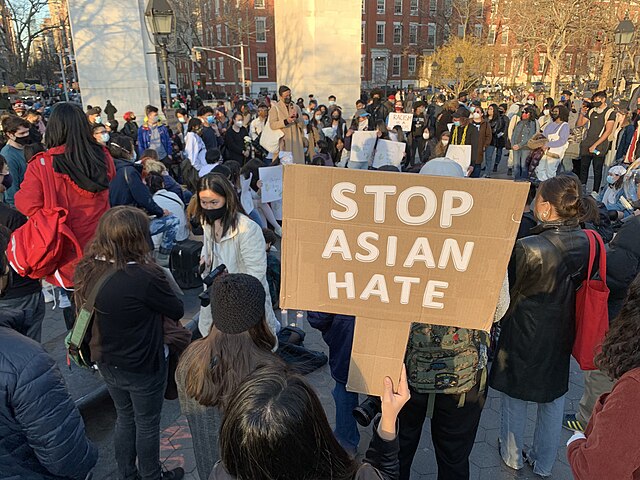By Irfan Shariff
NORTHWEST ASIAN WEEKLY
Data shows a surge in Asian American hate crimes since the onset of the COVID-19 pandemic. Yet “there’s a profound absence of quality data reflecting the hate incidents and experiences endured,” states John C. Yang, president of Asian Americans Advancing Justice – AAJC (Advancing Justice – AAJC) in Washington, D.C.
On Feb. 29, Advancing Justice – AAJC and Asian Americans Advancing Justice – Southern California (AJSOCAL), in partnership with Microsoft, launched the Asian Resource Hub (asianresourcehub.org) “to fill these gaps, and provide awareness and data that empower the AAPI community to confront and overcome these challenges,” said Yang.

Combating anti-Asian hate and sentiment, a new web site has been launched. (Photo via Wikimedia Commons)
“We could not wait for the next tragedy to occur before we address this gap,” said Connie Chung Joe, CEO of AJSOCAL, citing the violence of the 2021 Atlanta spa shootings and 2023 Half Moon Bay shootings.
The Asian Resource Hub is a “free online destination that illustrates the Asian American experience within the scope of discrimination and hatred,” said Joe. In creating it, “we had two goals: to help viewers immerse themselves through interactive, vibrant data…and to provide, in their own Asian languages, a searchable national directory of organizations that offer culturally and linguistically appropriate help.”
The hub pieces together data from FBI reports, the U.S. Census Bureau, local law enforcement, and community trackers like StopAAPIHate.org and StandAgainstHatred.org, and weaves it into a format that Joe calls “scrollytelling, which is storytelling while scrolling.”
The Data Narrative section of the hub is a collection of visualizations and interactive dashboards powered by Microsoft’s Power BI software. The narratives range from demographic information and a timeline of anti-Asian hate to in-depth details on select cities and a history of reported hate crimes.
The interactive dashboards offer different ways to drill down and slice data. For example, in the City Snapshots data story, the user can explore FBI versus local law enforcement data, while in the Demographics dashboards, users can view AAPI growth by state and county, and also by Asian, Native Hawaiian/Pacific Islanders, or both.
“You’re grabbed by visualizations, graphics, photographs, and pop-up text of anti-Asian hate,” she said. “We want it to be shared widely to empower AAPIs and inform our allies.”
Merisa Heu-Weller, general manager of Technology for Fundamental Rights at Microsoft, believes that “by understanding and analyzing data, we can provide insights for community members to better understand what is happening in the neighborhoods where they live, work, and play.”
But the fight doesn’t stop there. The Asian Resource Hub provides “our community members with resources and narratives that they need to build resilience and feel empowered,” said Yang. “It is community-based and also community focused.”
The Find Help section serves the second goal of the hub, which is providing culturally competent resources and services to address community needs. This national resource directory includes about 100 organizations that have been individually vetted by AJSOCAL and Advancing Justice – AAJC. Users filter by services like mental health, domestic violence, and youth programs, but also by the language spoken by these organizations.
The data narratives and resource directory is accessible in English, Traditional and Simplified Chinese, Korean, and Vietnamese, with plans to expand into Hindi, Tagalog, Khmer, and more languages over time.
It is meant to be an “evergreen site,” said Joe. “It is intended to continue to be built up.” Joe invites community members to nominate their organization to be added to the resource directory. The teams are still working through how journalists and media can cite data found on the hub.
While the hub doesn’t provide its own method to track hate crimes, it provides links to the Stand Against Hate (https://www.standagainsthatred.org/) and Stop AAPI Hate (https://stopaapihate.org/) trackers.
During the height of the COVID-19 pandemic, AJSOCAL conducted a community survey in the Los Angeles area, where they discovered a majority of AAPI did not feel there was support for victims of racial discrimination and harassment, said Joe.
“They said they wish there were youth services and counseling services available for our communities in our languages,” said Joe. “Even though these community services did indeed exist, we realized they weren’t aware of how to find those organizations and get the help they needed.”
The Asian Resource Hub gathers together two key pieces to help fight hate. By providing immediate action after learning about hate, users can combat by getting the services they need.
To learn more, visit Asian Resource Hub (https://asianresourcehub.org).
Irfan can be reached at info@nwasianweekly.com.



